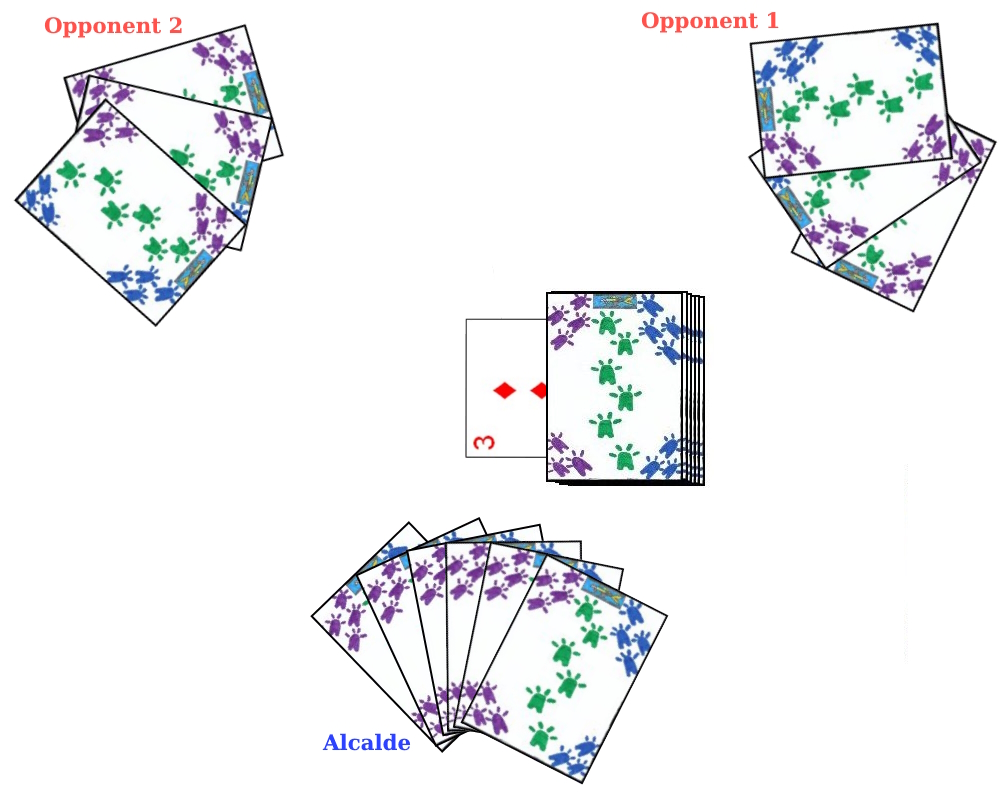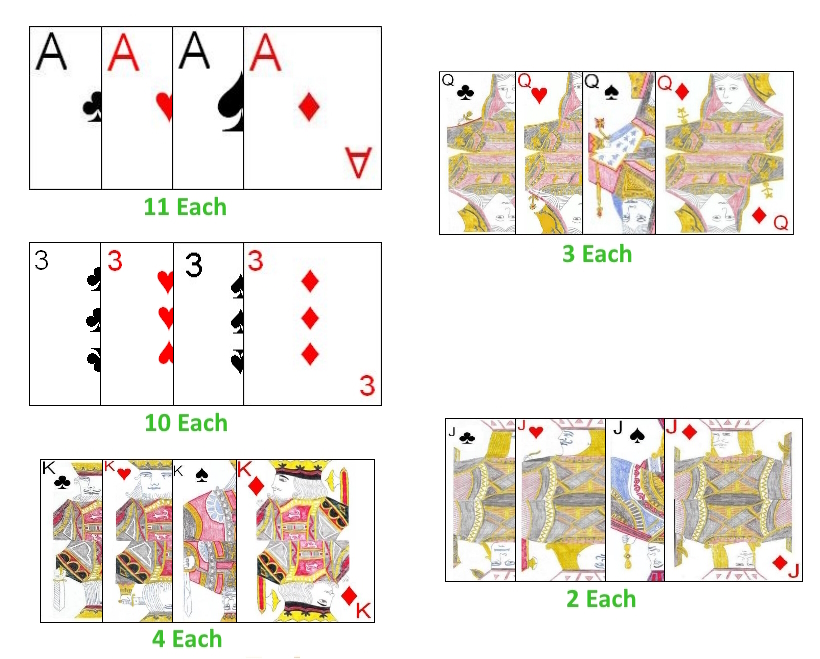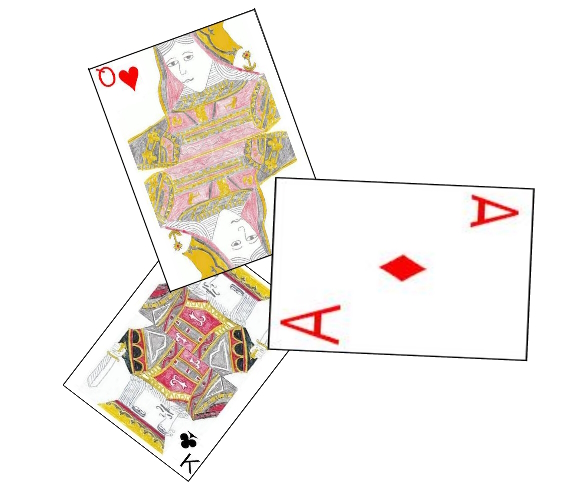 Alcalde is a variant of Brisca (which itself appears to be founded from
Briscola) which originated and is primarily played in, Puerto Rico. Alcalde which translates to Akalda or Mayor, is designed for three player and is traditionally played using the 40 card Spanish deck. The game features one player (the Alcalde or Mayor) who, through play, attempts to retain his title while his two opponents attempt to depose him. The deck
used to play Alcalde consists of cards in the following denominations; Ace, 2, 3, 4, 5, 6, 7, Jack, Caballo
(also known as Horse or Knight), and King, in each of four suits (Gold
Coins, Glasses, Batons, and Swords). However, if a Spanish deck is not
available for play of the game, a standard 52 card French suited deck can
also be used, by removing all the cards in that deck of the following
denominations (8, 9, 10), leaving a 40 card deck. The ranking of the
cards in the deck would be as follows (from high to low); Ace, 3, King,
Queen (which replaces the Caballo from the traditional Spanish deck), Jack, 7, 6, 5, 4, 2.
Alcalde is a variant of Brisca (which itself appears to be founded from
Briscola) which originated and is primarily played in, Puerto Rico. Alcalde which translates to Akalda or Mayor, is designed for three player and is traditionally played using the 40 card Spanish deck. The game features one player (the Alcalde or Mayor) who, through play, attempts to retain his title while his two opponents attempt to depose him. The deck
used to play Alcalde consists of cards in the following denominations; Ace, 2, 3, 4, 5, 6, 7, Jack, Caballo
(also known as Horse or Knight), and King, in each of four suits (Gold
Coins, Glasses, Batons, and Swords). However, if a Spanish deck is not
available for play of the game, a standard 52 card French suited deck can
also be used, by removing all the cards in that deck of the following
denominations (8, 9, 10), leaving a 40 card deck. The ranking of the
cards in the deck would be as follows (from high to low); Ace, 3, King,
Queen (which replaces the Caballo from the traditional Spanish deck), Jack, 7, 6, 5, 4, 2.
Determination of the first dealer (and the first Alcalde in the game) can be determined using a variety of methods, with a draw for high card being the most common. Using this method, each player draws one card, unseen, from the shuffled deck. Any players drawing cards of the same denomination should set that card aside and draw another, continuing until drawing a card drawn by no other player. The player drawing the highest card of all is set as the first Alcalde and also the first dealer. If there is any dispute regarding seating positions, the players seat themselves at the table in order of preference from highest card drawn to lowest.
Once the players are seated and the Alcalde determined, that player then thoroughly shuffles the deck and offers it to the player at his left to cut. After the cut, the Alcalde then begins dealing the cards in a counter-clockwise direction around the table starting with the player at his immediate right. He deals each of his opponents a total of three cards each and six cards total to himself. He can do this by dealing in three rotations, distributing one card to each opponent and two to himself on each rotation. After the deal had been completed, the Alcalde then deals the next card from the stock face-up on the table. The suit of this card sets the trump suit to be used for this hand. He then places the remainder of the face-down stock partially on top of this trump designator card.
If the trump designator card is a card of rank Jack, Caballo (Queen), King, 3 or Ace, any player having the seven of the trump suit can exchange the seven for the trump designator card. Similarly, a player having the 2 of the trump suit in hand may exchange this card for the trump designator card. While the seven can be exchanged by a player at any time during the game, the two can only be exchanged before the first trick has been played to by each player. If one player has the two and another the seven and both want to exchange for the trump designator card before the first trick has been completed, the player with the two has the first privilege to so exchange.
During play the two opponents of the Alcalde are permitted to view each others cards, but they may not provide any guidance on which of those cards to play.
The player to the immediate right of the Alcalde plays the first card to the first trick, and each other player in a counter-clockwise direction in turn, plays to that same trick. While the opponents of the Alcalde each play (or lead) one card to a trick, the Alcalde plays two cards to each trick. A player may play any card (or cards, in the case of the Alcalde) currently remaining in their hand to the trick with no restrictions based on the denomination or suit originally played to that trick.
After each player has played to the trick, in turn, it is determined who has thus won that trick. If the trick contains any cards from the trump suit, the trick is won by the highest such card in that trump suit. If the trick contains no cards from the trump suit, it is instead won by the highest card of the suit originally led to the trick. The player of the card winning the trick then places the card in a face-down pile of cards won in tricks. After each trick, as long as cards remain in the stock, each opponents of the Alcalde each draw one card and the Alcalde draws two cards from the stock. The winner of the trick draws first, and each other player draws in turn, in a counter-clockwise order from the dealer. Once the stock pile has been depleted, the players continue play using the cards remaining in the hand.
Once all ten tricks have been played and won, the Alcalde then sorts through his pile of cards won in tricks. Certain cards in the deck have a specific scoring value as follows:
|  |
The point scoring cards are called Briscas. If the Alcalde manages to capture 60 or more total points (which is at least half the total points available in the entire deck) during the hand, he is said to win the game, and he remains the Alcalde (and the dealer) for the next hand. He also earns one Game Point. However, if the Alcalde earns fewer than 60 points during the hand, his opponents are said to win instead (each earning one game point). The player to the immediate right of the dealer is then set as the Alcalde (and dealer) for the next hand.
The game can be played with each hand considered a complete game, or a game session can be played until one or more players reaches a specific point total goal (such as 7).
